OUR SELECTION OF JAMS
Jam is the name by which we identify all fruit-based preserves.
The production of this sweet sauce is very old, we already find mention of it in the recipe book of the Roman writer Apicius, who tells us that in the 4th and 5th centuries the Greeks boiled quinces together with honey to make a sweet spreadable mixture.
The products are prepared on the traditional way: using small pots, low heat, fresh fruit but with modern health and hygiene standards.
These handmade jams are made from natural fresh fruit, with no added sugar, colouring agents or preservatives.
Sugar was removed from the recipes and grape juice was added, which has a low glycaemic index, a mild flavour and allows the fruit to release all its aromas and flavours
APRICOT JAM
75% FRUIT

Apricot jam, besides being great with bread and butter for breakfast, is also delicious with cheeses such as Brie or Camembert.
Why is it important to eat apricot jam?
Apricots are rich in minerals, especially potassium and beta-carotene which is the precursor of Vitamin A. Potassium regulates blood pressure, lowering it, as it promotes the elimination of excess fluids, thereby also combating water retention. It also regulates the heart rate.
Beta-carotene is a natural pigment that is responsible for the yellow-orange colour of apricots.
In the body it is converted to Vitamin A or retinol, of which it is therefore the precursor. Vitamin A is essential for maintaining eye function, including night vision, and for cell growth and differentiation.
Beta-carotene has strong antioxidant activity, counteracting the free radicals responsible for cellular ageing.
PLUM JAM
75% FRUIT
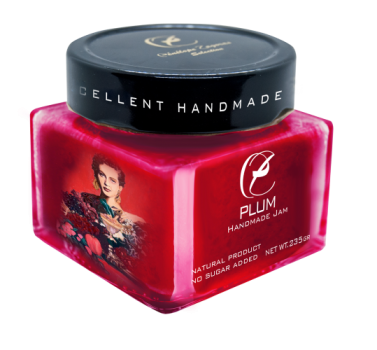
A delicate and versatile jam: delicious on crusty bread, excellent for a warm tart, but also excellent as an accompaniment to blue cheeses such as Gorgonzola or Roquefort or to cheeses covered with the classic mould that makes their flavour very special.
Plum jam is perhaps the most rustic of jams, but the one that smells most like home… and summer! Plums are in fact a summer fruit that the trees often produce in large quantities but which must be consumed quickly because they tend to spoil very quickly.
With its classic, vaguely sour flavour, plum jam is full of hidden beneficial properties.
Plums are a fruit that brings great benefits to our organism, as well as a unique fragrance and sweetness: they are rich in water, vitamins and mineral salts that make them invaluable for the body and a valuable aid against tiredness.
The flesh of plums is rich in antioxidants and this fruit provides a good sense of satiety without being fattening because it contains few calories.
APPLE & RAISINS JAM
75% FRUIT
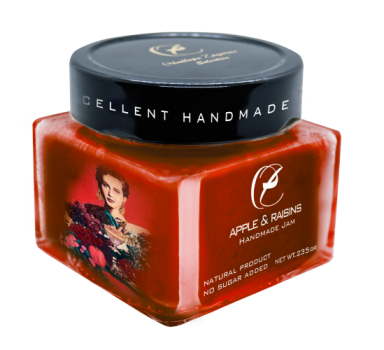
A fine and delicate jam, a sweet breakfast star that also goes perfectly with blue cheeses.
Low in calories and rich in properties, the apple is one of the most widely cultivated fruits in the world today.
Apples consist mainly of carbohydrates and water, are rich in simple sugars (such as fructose, sucrose, and glucose) but have a low glycaemic index, 36, and this is certainly due to their good fibre content.
In terms of micronutrients, the apple contains several vitamins (B1, B2, B3, folates, Vitamin A and Vitamin C) and minerals (sodium, potassium, iron, calcium and magnesium). In addition, several substances are present that give the apple antioxidant properties. Among these we find in good quantities quercetin (anti-inflammatory, anti-viral, anti-cancer and anti-depressant role), catechin (famous for its presence in green tea, it acts by improving brain and muscle functions), chlorogenic acid (also present in green coffee, useful in reducing blood sugar and promoting weight loss).
Grapes are not the least calorific of fruits, but their sugars are natural and not comparable in effect to refined artificial ones. In addition, grapes contain a good amount of vitamin C and vitamin B6 (a very important vitamin for the production of energy by our cells), potassium and copper, as well as malic, tartaric and citric acid.
However, it is above all the presence of polyphenols that gives grapes many beneficial properties. These valuable antioxidants help to counteract the action of free radicals and thus cellular ageing.
ORANGE JAM
75% FRUIT
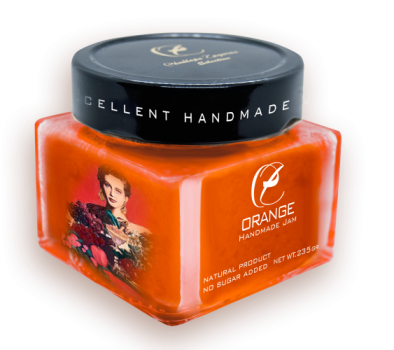
Sweet and flavoursome, orange jam is ideal for breakfast on bread or for a tart or for delicious desserts, but it also goes very well with goat’s cheese or well-aged cheeses.
The benefits of oranges are numerous. Oranges are a great source of vitamin C!
The benefits of this vitamin for the body are many: it strengthens the immune system against viruses and bacteria; it prevents cardiovascular disorders; it allows the body to better absorb iron and has anti-anaemic properties.
Thanks to vitamin C and vitamin A, in their different forms, oranges are an excellent source of natural antioxidants, which help reduce harmful free radicals in the body and fight ageing.
The presence of potassium in oranges, a type of electrolyte mineral, brings important benefits to the heart. Potassium is a key component of cells and body fluids that counteracts sodium, helping to control heart rate and blood pressure.
Thanks to their supply of bioflavonides, and their interaction with vitamin C, oranges promote the reconstitution of connective tissue collagen, which benefits bones and teeth, as well as cartilage, tendons and ligaments. In this way, they prove to be an excellent natural remedy against arthritis!
In short, the benefits of oranges are many and exploiting them in a sweet and tasty version such as orange marmalade is the best way to accompany the day.
PEACH JAM
75% FRUIT
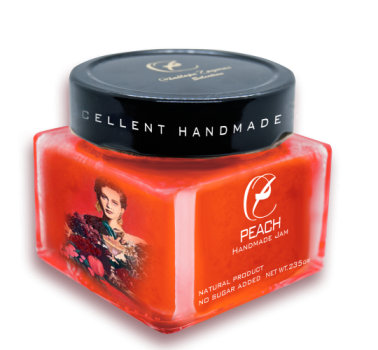
This jam is a fragrant delicacy. Delicious with bread and butter at breakfast to enjoy its full aroma, or as the main ingredient in a crumble for a mouth- watering moment, or as an accompaniment for cheese, on cottage cheese or as a base for various cakes and tarts.
Peach jam helps your health. The low calories of peaches (39 per 100 g edible part), combined with their high water content and good satiating power, make them an ideal fruit for low-calorie diets or for those who want to keep fit by having a healthy, light snack. Peaches contain very little fat and protein with a low biological value.
The fibre and carbohydrate content, on the other hand, is good.
In terms of micronutrients, however, peaches contain good amounts of vitamins (especially vitamin C and some B vitamins), minerals (potassium, magnesium, phosphorus) and antioxidant compounds.
POMEGRANATE JAM
75% FRUIT
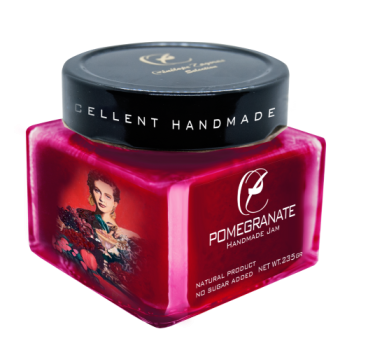
Besides being excellent on bread for breakfast, the sweet taste, with a sour background and bitter, astringent notes, also makes this jam a perfect match for creamy cheeses. There are many beneficial properties of the pomegranate, and it is no coincidence that we often hear about it as a real panacea for our organism.
Nothing could be truer! In fact, the pomegranate is a true superfood, best known not only for its flavour, but also for its antioxidant qualities and the many vitamins it contains, leading some to call it a food-pharmaceutical.
Its grains are rich in juice, which in turn is full of Vitamin C, antioxidants, including flavonoids, which give it anti-inflammatory, gastro-protective properties and help keep the arteries, heart and cardiovascular system healthy.
But the pomegranate is also rich in Vitamins A, B, K and E.
What’s more, within this fruit are also phenols (especially gallic acid, grenadine, punicalin, punicafolin and others), which are very active in counteracting free radicals, which are among the major contributors to tissue and skin ageing.
FIG JAM
75% FRUIT
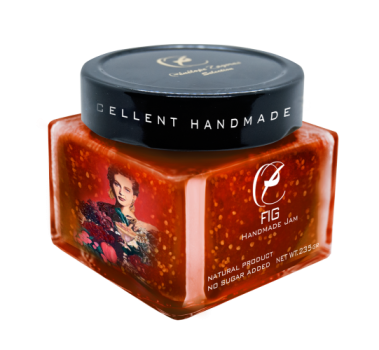
Delicious jam. A delicacy for a mouth-watering breakfast, but also excellent with mature and piquant cheeses, refined with foie gras pâté or as a base for various cakes and tarts.
Because of its fragrant sweetness, the fruit of the Ficus carica has been appreciated by various cultures and peoples of antiquity.
In classical Greece, the Fig tree was considered ‘worthy of nourishing orators and philosophers’. The well-known Greek philosopher Plato (428 – 348 BC) was nicknamed the ‘fig-eater’. Not much has changed because even today. Figs are among the most popular fruits in the world. Since figs are a seasonal fruit that degenerates quickly, fig jams are an excellent way to preserve these summer fruits and benefit from the fig’s many nutrients every month of the year.
This jam is made only with figs and a little grape sugar, thus preserving the natural sweetness of the fruit and its healthy active ingredients. Just two ingredients for an ancient food, useful for our well-being and a healthy choice for snack or breakfast.
STRAWBERRY & ARONIA JAM
75% FRUIT
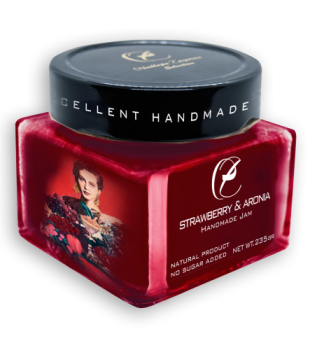
An excellent jam for breakfast but, thanks to the right mix of the astringent and acidulous taste of aronia with the sweet taste of strawberry, it also goes well with goat cheeses.
Strawberries are a spring fruit rich in properties, with a sweet, sugary flavour that makes them a favourite food for young children. A member of the Rosaceae family, the plant is called Fragaria vesca, a term reminiscent of the Latin noun ‘fragrans’, meaning fragrant, with which the Romans used to refer to these delicious fruits.
Strawberries have few calories, only 30 per 100 grams, but it is a very rich source of several nutritional compounds and in particular sugars, vitamins, flavonoids and anthocyanins. These nutrients, acting synergistically, give the strawberry useful properties to promote health and prevent various diseases. The sugar content of strawberries is modest (more than 5 g per 100 g of food) and they have a good amount of fibre, compared to an almost negligible amount of lipids.
Aronia berries are undoubtedly an exceptional gift from nature.
They have a powerful antioxidant and antiseptic action, strengthen the anti-ageing immune defences, help detoxify the body, are a source of energy, maintain well-being and improve eyesight.
They activate the metabolism and help prevent cardiovascular diseases.
BERRY JAM
75% FRUIT

The scent of wild berries makes this soft jam perfect for your breakfast as well as for your delicious tarts, but it can also be paired, as the rule of contrast dictates, with savoury and mature cheeses, but also with fresh cheeses such as ricotta for combinations that play with the affinity of flavours.
Raspberries, bilberries, cranberries, blackberries, currants and wild strawberries are valuable allies for health. These extraordinary berries are rich in antioxidants, beneficial substances that protect us from disease and help prevent and fight infection. Raspberries in particular help us prevent and fight inflammation thanks to their purifying, diuretic and refreshing action, which accelerates the healing of all joint inflammations.
Berries are rich in vitamins, especially A, B1, B2 and C, and then contain minerals, including potassium, which is important in a healthy diet. They are rich in fibre.
From a nutritional point of view, berries boast some common characteristics; apart from containing plenty of water and fibre, they provide a medium amount of sugar (fructose), and do not contain many calories.
PINAPPLE JAM
75% FRUIT
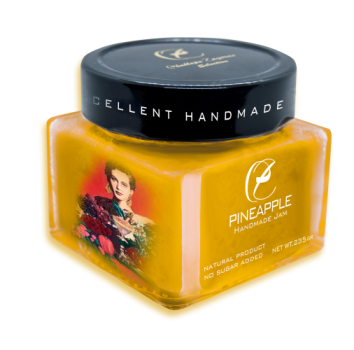
Pineapple jam will liven up your breakfast, but it also goes very well with mediumaged cheeses and herbs. The pineapple is an exotic fruit that arrived in the Old
Continent thanks to Christopher Columbus who imported it on his return from his discoveries and its goodness is unquestionable, whether eaten as it is, as a jam, included in centrifuges, or in some sweets and, why not, even in the preparation of savoury dishes!
But even more importantly, pineapple has excellent properties and beneficial effects on our health: it is a fruit rich in mineral salts, such as potassium and magnesium, it has a low sugar content and its beneficial digestive, anti-inflammatory, diuretic and slimming properties are well known thanks to the presence of bromelain, a substance that stimulates and accelerates the metabolism.
Of great importance is the presence of vitamin C, a very powerful antioxidant able to fight a myriad of free radicals in the body and therefore a very good ally against ageing and heart disease, as well as the presence of manganese, a mineral necessary for our body in the construction of bones and all the tissues that connect to them.
A good slice of pineapple provides almost 73% of the manganese needed for the body to function properly and also contains about 195mg of potassium and 1mg of sodium, elements that are excellent for controlling high blood pressure in a natural way.
ARONIA, MATCHA TEA & GREEN APPLE
75% FRUIT
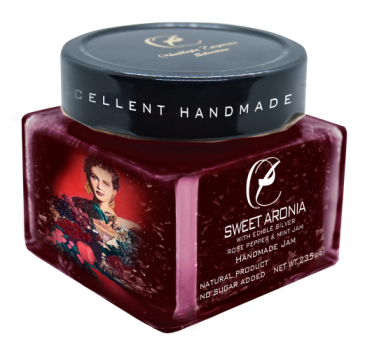
Fresh and tasty jam: excellent at breakfast, also suitable as an accompaniment to an assortment of cheeses.
Many of the benefits we can obtain from consuming Aronia berries derive from the presence of anthocyanins, which provide excellent antioxidant properties that help fight and prevent cellular ageing and damage caused by excess free radicals, known as oxidative stress. This strong antioxidant property is also associated with the anti-inflammatory properties of this berry, helping, on the whole, to reduce inflammation-related disorders such as cardiovascular problems and arthritis.
Matcha tea is rich in beneficial properties. It contains vitamins B1, B2 and C, beta-carotene, minerals, polyphenols and caffeine (not excessive). It contains valuable antioxidants, especially catechins and polyphenols, and is therefore considered a valuable anti-ageing, draining and detoxifying remedy. It also calms and relaxes, improves our mood, aids concentration and gives energy.
“An apple a day keeps the doctor away”, preferably a green one. Old popular sayings are always deeply rooted in reality, and those concerning this typical product from Greece are particularly well-founded.
This variety of apple can boast extraordinary qualities that can improve our health and even activate a preventive action on our organism, as they are full of mineral salts (potassium, magnesium, phosphorus and calcium), vitamins (especially C), flavonoids and polyphenols. A treasure trove of substances, coupled with a total lack of cholesterol and a low level of calories (38 Kcal per one hundred grams of fruit).